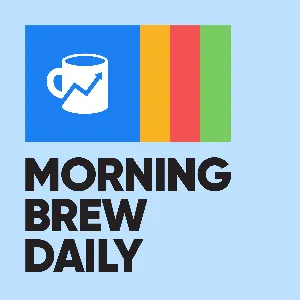Podcast Summary
US debt rating downgraded by Fitch: Fitch downgraded US debt rating, potentially leading to increased borrowing costs, but other agencies still maintain top credit rating
The United States' creditworthiness took a hit when Fitch downgraded its debt rating from triple A to double A plus. While this doesn't significantly change the risk for investors in US treasuries, the implications could be worrying due to the widespread holding of US government debt around the world. This downgrade is the second biggest news for Caroletta Binder, who was closely following the development even from her hospital bed after giving birth. The timing of the downgrade might come as a surprise, but it's essential to understand that credit rating agencies play a crucial role in determining the perceived risk of a country's debt. This downgrade might lead to increased borrowing costs for the US government in the future. However, it's important to note that this is just one rating agency's opinion, and other agencies still maintain the US's top credit rating.
US debt downgrade by Fitch to AA+: Fitch downgraded US debt due to concerns over increasing debt burden and governance issues, despite a strong labor market and falling inflation. The debt, currently over 119% of GDP, makes it difficult to imagine a decrease, and governance concerns were also cited.
Despite recent positive economic news, such as falling inflation and a strong labor market, a ratings downgrade from Fitch, moving the US government debt from AAA to AA+, serves as a reminder of the ongoing concern regarding the country's increasing debt burden and governance issues. The debt, which currently stands at over 119% of GDP, is seen as a significant concern by Fitch, despite comparisons to other countries with high debt levels. The partisan budget process in the US makes it difficult to imagine how the debt will decrease, adding to the worry. Additionally, governance concerns were cited as a reason for the downgrade. While a default is not imminent, the possibility has been moved from 0% to a very small percent, casting a shadow over the otherwise promising economic outlook.
Reasons for potential US credit rating downgrade: Rising interest rates, inflation, partisanship, and potential recession threaten the US AAA credit rating
There are several reasons why rating agencies are considering downgrading the United States' AAA credit rating. The first reason is the ongoing governance issues in the US, including intense partisanship and the politicization of the debt limit. The second reason is the rising interest rates due to high inflation, which increases the government's debt burden. The third reason is the prediction of a potential recession, which would increase government spending and decrease tax revenue, leading to an increase in debt-to-GDP ratio. Economists find the timing of this potential downgrade bizarre, as there doesn't seem to be new information indicating a need for a rating change. Despite some signs of a soft landing, the high interest rates and potential for a recession keep the possibility of a downgrade alive, even if it's small.
US Sovereign Debt Downgrade: Not an Economic Apocalypse: The US debt downgrade by Fitch doesn't signal economic doom, but long-term trends and political standoffs may affect borrowing costs.
The Fitch rating agency's decision to downgrade the US sovereign debt rating to AA from A+ is not necessarily an indication of impending economic doom. While this downgrade may increase the cost of borrowing for the US government, it does not reflect new, negative information about the economy. Instead, rating agencies are focusing on long-term economic trends. The impact on individuals' 401k plans is uncertain, but historical precedent suggests that market reactions may be limited. The downgrade is a blow to US pride, but it is not expected to lead to economic Armageddon. However, it is important to note that disagreements within the administration over the downgrade may influence the government's response. The administration, including Treasury Secretary Janet Yellen, has publicly disagreed with the decision, as it could make financing the debt more expensive. Overall, the downgrade is a reminder of the importance of long-term economic trends and the potential impact of political standoffs on financial markets.
US Debt Situation: A Newborn's Future at Stake: The US debt situation remains uncertain, potentially impacting future generations including a newborn baby. Sponsored by Saatva and Fundrise.
The US debt situation is uncertain, but it's hoped that the country doesn't default on its debts for the sake of future generations, including a newborn baby. The episode was produced by Corey Bridges, engineered by Josh Newell, fact-checked by Sarah Juarez, and edited by Kate Concannon. It was sponsored by Saatva, offering luxury mattresses at affordable prices through online sales. Another sponsor, Fundrise, mentioned the potential for discounted real estate investments due to high interest rates and the expansion of their $1 billion portfolio. Always remember to consider investment objectives, risks, charges, and expenses before investing.






